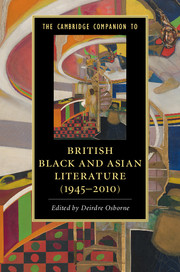Book contents
- Frontmatter
- Dedication
- Contents
- Contributors
- Acknowledgements
- Timeline
- Introduction
- PART I TRACES AND ROUTES
- PART II TRANSLOCATIONS AND TRANSFORMATIONS
- PART III RESTORATIONS AND RENOVATIONS
- 7 Recalibrating the Past: The Rise of Black British Historical Fiction
- 8 Black Women Subjects in Auto/biographical Discourse
- 9 British Black and Asian LGBTQ Writing
- 10 The Poetics and Politics of Spoken Word Poetry
- 11 Post-colonial Plurality in Fiction
- PART IV NATIONAL, INTERNATIONAL, TRANSGLOBAL
- Further Reading
- Index
- Series list
7 - Recalibrating the Past: The Rise of Black British Historical Fiction
from PART III - RESTORATIONS AND RENOVATIONS
Published online by Cambridge University Press: 05 September 2016
- Frontmatter
- Dedication
- Contents
- Contributors
- Acknowledgements
- Timeline
- Introduction
- PART I TRACES AND ROUTES
- PART II TRANSLOCATIONS AND TRANSFORMATIONS
- PART III RESTORATIONS AND RENOVATIONS
- 7 Recalibrating the Past: The Rise of Black British Historical Fiction
- 8 Black Women Subjects in Auto/biographical Discourse
- 9 British Black and Asian LGBTQ Writing
- 10 The Poetics and Politics of Spoken Word Poetry
- 11 Post-colonial Plurality in Fiction
- PART IV NATIONAL, INTERNATIONAL, TRANSGLOBAL
- Further Reading
- Index
- Series list
Summary
It is perhaps no longer enough to talk about the role of history in post-war Black British literature. The gradual emergence of historical subjects within this writing over the last sixty years itself needs to be historicised. The canon of the 1950s is characterised by novels and short stories unfolding in the present. Sam Selvon's The Lonely Londoners (1956) and Ways of Sunlight (1957), E. R. Braithwaite's To Sir With Love (1959), George Lamming's The Emigrants (1954) and Andrew Salkey's Escape to an Autumn Pavement (1960) are all published in early post-war London, and set in early post-war London. The same is true of the 1960s and 1970s: Beryl Gilroy's Black Teacher (1976), Buchi Emecheta's In the Ditch (1972) and Second-Class Citizen (1974), Farrukh Dhondy's short-story collections East End at Your Feet (1976) and Come to Mecca (1978), and Linton Kwesi Johnson's poems Dread Beat and Blood (1975) are all works that capture with dramatic immediacy the pressing political period in which they were published. History is certainly not absent from this period of writing, whether as the modernist nightmare evoked in the epigraph to Lamming's The Pleasures of Exile (1960) – ‘History is a nightmare from which I am trying to awake (James Joyce)’ – or as wistful ‘oldtalk’ in Selvon's The Lonely Londoners. Nevertheless, from the 1970s on it is possible to speak of a distinct historical turn in Black British and British Asian literature. The 1980s and 1990s in particular saw a proliferation of texts dealing with the history of slavery, a subject that was relatively neglected within Black British writing until that point. Many of these texts might be said to evoke what Stuart Hall has called ‘the outside history that is inside the history of the English’, stories that unfold largely overseas but that are constitutive of the British past. Since the 1990s, writers have also focused increasingly on the ‘internal’ history of post-1945 black settlement to the extent that we could now reconstruct a domestic story of the post-war British past through its historical representation in Black literature. World War II forms a focal point in Dennis Ferdinand's Duppy Conqueror (1998), Zadie Smith's White Teeth (2001) and Andrea Levy's Small Island (2004).
- Type
- Chapter
- Information
- Publisher: Cambridge University PressPrint publication year: 2016
- 2
- Cited by



